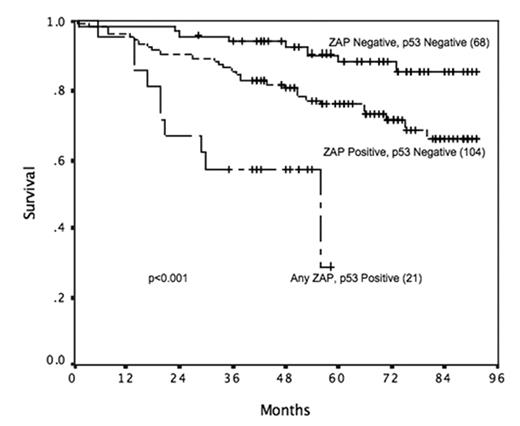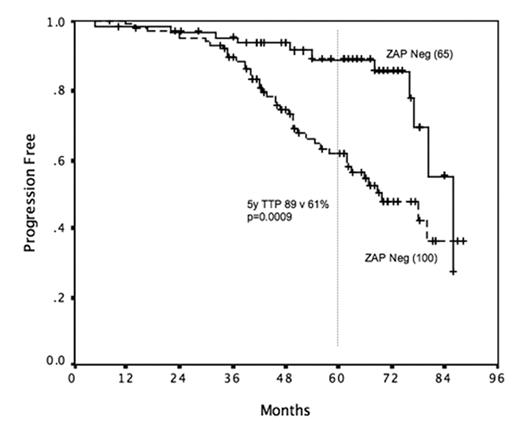Abstract
Background: IgVH mutation status (IgVH MS) in chronic lymphocytic leukemia (CLL) is accepted as a powerful prognostic indicator, however, this test is not widely available. Therefore, ZAP70 expression, first described as a surrogate for IgVH MS, but also described as an independent prognostic marker, is more commonly used. ZAP70 expression can by detected by flow cytometry or immunohistochemical staining (IHC) methods, but the optimal detection method is controversial. Though cytogenetic abnormalities of 17p in CLL have been reported as a poor prognostic indicator when compared to other abnormalities, the prognostic effect of p53 expression by CLL has not been well described, nor has it’s utility in combination with ZAP70 expression been reported.
Methods: The bone marrow specimens from 2 cohorts of CLL patients (pts), specifically 208 pts uniformly treated with FCR between 11/99–01/04 and 349 CLL pts entered in the Low Risk FISH (LRF) study (no 11q or 17p FISH abnormalities) between 1/04 - 05/07, were evaluated for ZAP70 expression by IHC. IgVH MS was available for 61/208 FCR pts and all LRF study pts. The FCR group was evaluable for complete response (CR) and CR duration. 215 LRF study pts were evaluable for time to first treatment and 114 pts were evaluable for response to either FCR-type therapy (74pts) or rituximab-based therapy (40pts). 193 BM specimens from the FCR cohort were also studied for p53 expression by IHC staining.
Results: IgVH MS showed good concordance (80%) with ZAP70 IHC expression(table 1). The time to first therapy for the LRF cohort was 18% v 43% at 18 months for ZAP70+ versus ZAP70− CLL pts (p=0.0001). However ZAP70 IHC did not predict response in either the FCR cohort (n= 208) or the LRF cohort (n=114). In 193 FCR pts, a significant correlation between p53 expression and overall survival, regardless of ZAP70 expression, was seen (p<0.001) (Figure 1). ZAP70 IHC expression correlated with the time to progression for 165 FCR pts who had achieved complete response (p=0.0009)(Figure 2).
Conclusions: ZAP70 IHC expression shows good correlation with IgVH MS for the pooled cohorts. ZAP70 IHC expression has additional value in predicting time to first therapy and time to progression, but does not have an impact on CR rate. The decreased CR duration is due to the ZAP70 relationship with IgVH MS. When ZAP70 and p53 expression are combined, decreased survival is seen in pts with p53+ CLL, regardless of ZAP70 expression.
SH status in combined cohorts (N=410) versus ZAP70 expression by IHC
| Combined cohorts N=410 . | IHC ZAP− . | IHC ZAP+ . | |
|---|---|---|---|
| Sensitivity 78%; Specificity 82% | |||
| IgVH MS | Mutated | 178 | 39 |
| Unmutated | 42 | 151 | |
| Combined cohorts N=410 . | IHC ZAP− . | IHC ZAP+ . | |
|---|---|---|---|
| Sensitivity 78%; Specificity 82% | |||
| IgVH MS | Mutated | 178 | 39 |
| Unmutated | 42 | 151 | |
Figure
Figure
Author notes
Disclosure: No relevant conflicts of interest to declare.



This feature is available to Subscribers Only
Sign In or Create an Account Close Modal